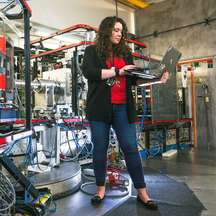
My degree was in Physics with Planetary and Space Physics and I worked in a Software Engineering group in the summers in between my years at university. I had mixed feelings between pursuing a career in Physics or in Software Engineering. I was attracted to STFC because it would allow me to begin a career in Software Engineering without losing my connection to physics. The Graduate Scheme seemed like a great opportunity to apply for with opportunities for training, placements and promotion at the end.
The most interesting part of my job is definitely learning about what my colleagues on the graduate scheme do. Everyone here is doing something interesting and different and it's great being able to find out what everybody’s doing. While I’m writing some software for ISIS, someone else is designing a magnet for CERN. I think it’s amazing to work somewhere with such a variety of work going on.
Last year I worked managing the roll out of 14 different external facing websites for STFC. It was hard work and logistically challenging; however it was a great feeling when the sites started to go live, knowing I had a hand in them getting there.
I was given the opportunity to line manage a couple of new starters. This was an interesting experience with some difficulties and highlights. However it was great seeing them complete a piece of difficult piece of work or show improvement with something they’d struggled with.
I definitely think the best part of STFC culture is the good work life balance STFC seems to encourage. We’re given lots of annual leave, flexi-time, paid overtime and we’re encouraged to take part in STEM activities during work hours. I think people end up working harder and better with a good work life balance and it definitely makes for a great place to work.
The people. STFC as whole seems to value characteristics that make people nice to work with, as well as job competency. I’ve found this makes for a great working environment, I come to work and enjoy who I’m working with and that makes such a huge difference to how much you enjoy work. I’ve made some great friends on the graduate scheme as well. Lots of us end up living together and meet up outside of work. It’s terrific having a group of people (approximately) your age in the same situation as you. It’s like being back in Uni except you get paid!
The Graduate Scheme supplied lots of training in soft skills and about how STFC works, which you don’t really think about a lot but are so important in the long term. Technical training is usually done by your home department and can take the form of on-the-job learning, online courses, actual courses, conferences etc. As a graduate you are definitely well-supported in all the training you’ll need.
I love working at STFC. I’m never bored, the work is challenging and interesting, I work with some great people and as a graduate I now have a great network of friends. No job is perfect, but I could definitely see myself staying here long term.
Part of STFC’s mandate is to encourage interest in science and careers in STEM to the general public, and because of this we are encouraged to help. I am a STEM ambassador and I’ve given tours of campus, tours of ISIS and given talks about STEM and STFC to schools and my old university.
Definitely the Flexi time. We can earn and take off 2 days a month, which has ended up being so useful. Not only does it let you build up extra days off, so you’re always compensated for your time, it means that if there is something you need to take a day off for, or have to come in late or go home early, you can do that without having to worry. The ability to set my own working hours (within reason) is so useful!
I would definitely say to be yourself and to be curious. Keep asking questions if you are interested in something or don’t quite understand it, or just want to know something more about it. I believe that it’s ok to not know the answers to everything, but you should always ask questions to try to learn the answers. STFC is at its core a research organisation and therefore built upon the principle of people asking questions and trying to answer them.